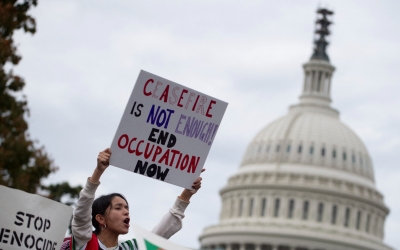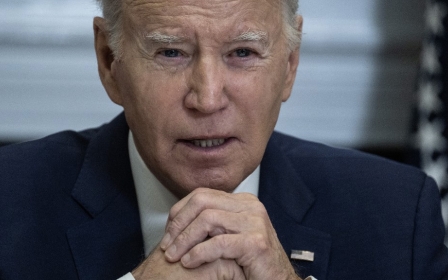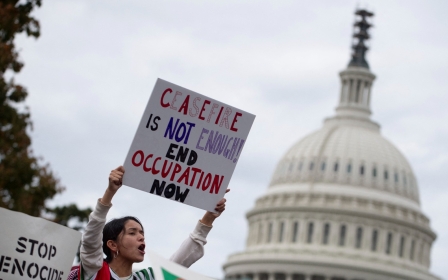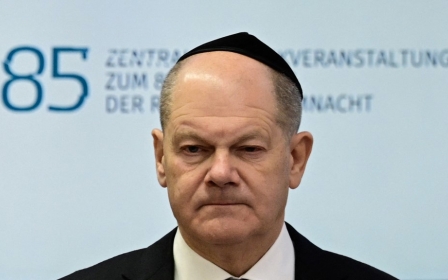War on Gaza: Invoking the Holocaust to justify Israeli war crimes dishonours its victims
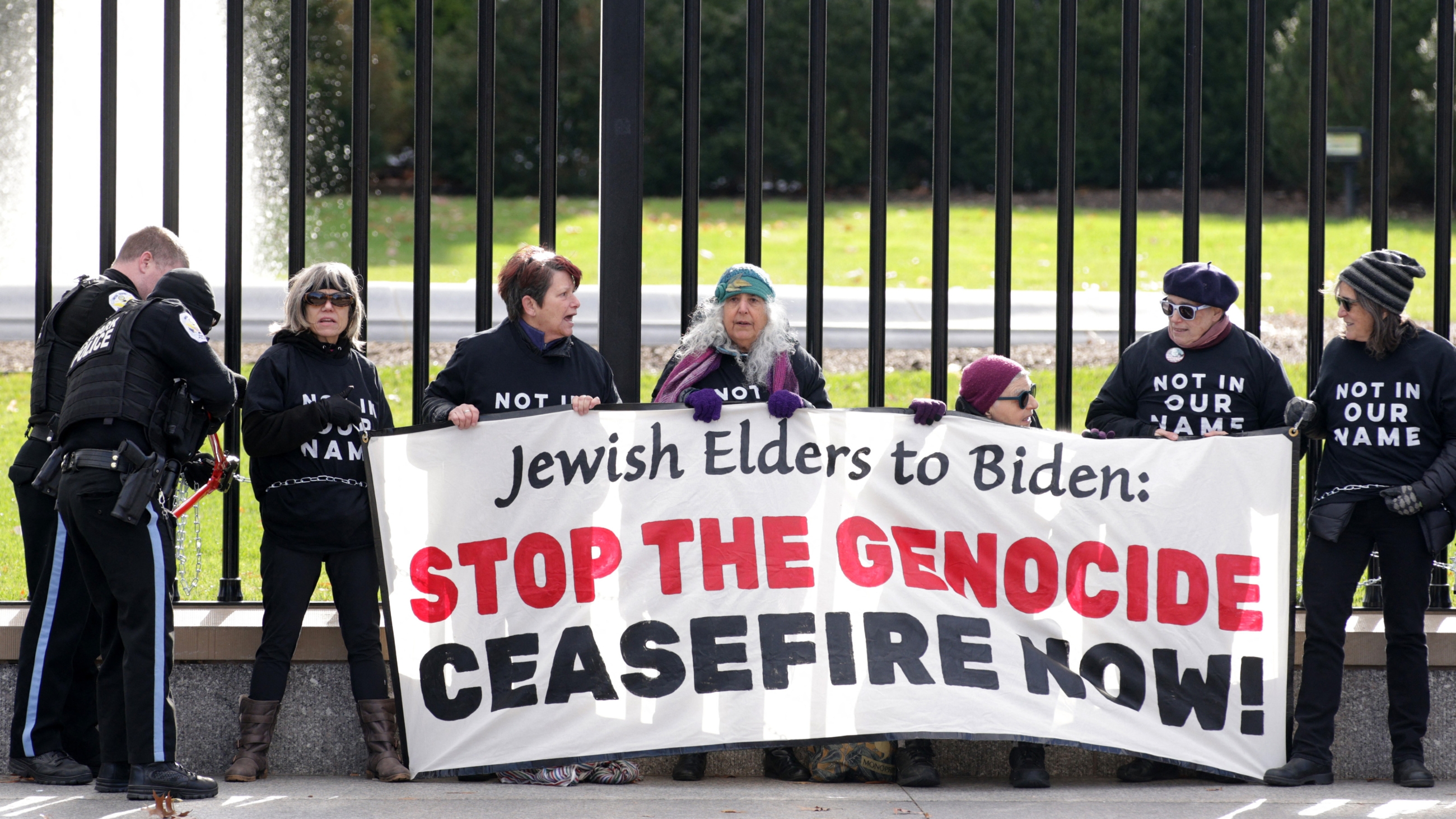
“We write to express our dismay and disappointment at political leaders and notable public figures invoking Holocaust memory to explain the current crisis in Gaza and Israel.”
This is how an open letter recently published by a distinguished group of scholars of the Holocaust and antisemitism begins. Its main concern is that appealing to the memory of the Holocaust risks obscuring the understanding of antisemitism and dangerously misrepresents the causes of violence in Israel and Palestine.
The scholars quote several problematic statements and acts by Israeli, European and American officials in the context of Israel's ongoing assault on Gaza following the Hamas-led attack on 7 October.
The Israeli ambassador to the UN donning a yellow star featuring the words “Never Again” while addressing the UN Security Council. Israeli Prime Minister Benjamin Netanyahu said that “Hamas are the new Nazis” and framing the war on Gaza as a battle for western civilisation in the face of barbarism. And US President Joe Biden remarked that Hamas had “engaged in barbarism that is as consequential as the Holocaust”.
It is impressive how western leaders are following the same script, to the point of uttering blatant absurdities, like conflating Israel with Ukraine when it is Palestine that has been occupied by Israel for more than half a century and should be equated to Ukraine.
New MEE newsletter: Jerusalem Dispatch
Sign up to get the latest insights and analysis on Israel-Palestine, alongside Turkey Unpacked and other MEE newsletters
Israel is invoking the Holocaust to justify what is nothing more than a collective punishment of the people living in Gaza. Almost all of its political leadership promoted an irrational and malign narrative beginning with Israeli President Isaac Herzog, who said that “there are no innocent civilians in Gaza”. Not a single word of condemnation for such outrageous statements was uttered by those western leaders who proudly uphold the so-called rules-based world order.
'Poisoned' political climate
Predictably, the open letter was contested by another group of distinguished scholars of Nazi Germany, the Holocaust, Israel, and antisemitism. It was a poorly argued response that did not seem to grasp the concerns raised by the scholars and was convincingly dismantled in a counter-reply.
The recent ordeal experienced by journalist Masha Gessen for speaking in support of Palestinians is a dramatic example of the toxic political climate in Europe
Amid a rising death toll of mostly women and children, the most the opposition letter could convey was a vague criticism of Israel's "poor decisions". Not a single shred of empathy for the ongoing humanitarian disaster was uttered.
Such insensitive positions have been echoed by unbelievable acts and behaviour by some European “democracies”. Peaceful public protests in support of Palestinian rights and asking for a ceasefire have been carefully watched and often hampered by authorities in the UK, France and, especially, in Germany. It is hard to ascertain if such behaviour is due to ignorance, laziness, fear or deliberate complicity with the Israeli government.
Follow Middle East Eye's live coverage of the Israel-Palestine war
It took several weeks for Josep Borrell, the EU foreign policy chief, to recognise that “far too many civilians have been killed in Gaza” and that “we are witnessing an appalling lack of distinction in Israel's military operation in Gaza”. It is even more depressing that another major EU power, Italy, issued appeals to Israel to ease its violence only after the Latin Patriarchate of Jerusalem denounced the killing of Christian civilians inside the Holy Family Parish in Gaza by Israeli snipers.
Far before the 7 October attack, European political discourse about the Israeli-Palestinian conflict had shifted and become poisonous; the old continent was experiencing its own McCarthyite period. Fundamentally flawed US and Israeli narratives about the conflict were accepted without even an eyebrow raised. To put it unequivocally, the mere assertion of Palestinian rights had become synonymous with antisemitism. Unbelievable smear campaigns were perpetrated against those who ask for justice for the Palestinians.
The ordeal experienced last week by Russian-American journalist and writer Masha Gessen is a dramatic example of such a toxic political climate.
Gessen had been awarded the prestigious Hanna Arendt prize for political thought, but the ceremony was almost cancelled because the host of the event, the Heinrich Boll Foundation, withdrew its support because of an article they had published days earlier in The New Yorker, emblematically titled “In the Shadow of the Holocaust”.
The writer’s unforgivable sin was that they equated the Jewish ghettos in Nazi-occupied Europe to the current situation in Gaza. Ironically, the award was meant to recognise “individuals who identify critical and unseen aspects of current political events and who are not afraid to enter the public realm by representing their opinion in controversial political discussions”.
The political climate has become so absurd that, according to an acute observer, the same “Hanna Arendt would not qualify for the Hanna Arendt prize in Germany today”.
For once, common sense finally prevailed, and the ceremony was held. Gessen delivered an outstanding lecture, emphasising how comparison is important to learn and to know the world. They also remarked that:
“A political project is something that happens in the present, in the world, among people. Hannah Arendt spent her entire intellectual life thinking about what constitutes politics. To her, politics was a space where we figured out how to live together in this world, a space of discussion and thinking and the creation of new possibilities. After the Holocaust, it’s a space in which we figure out how to live together in this world without repeating the Holocaust. One of the structures that we have invented, acting politically, to prevent a repetition of the Holocaust, is international humanitarian law, particularly the laws for the protection of civilians. It is also the framework of international jurisprudence, such as the International Criminal Court, war crimes tribunals, and universal jurisdiction trials. The concept of genocide, too, emerged as a result of the Holocaust.”
It is then depressing, to say the least, that international humanitarian law, whose codification emerged in the aftermath of the Holocaust, is now openly disregarded by the Israeli army in Gaza and the West Bank. It is equally absurd that the International Criminal Court would indict Russian President Vladimir Putin for the forced transfer of children from Ukraine to Russia, while not a finger has been lifted against Israel, which has not only forced the transfer of the children inside Gaza but has also killed at least 10,000 of them.
Weaponising antisemitism
The outcry against Masha Gessen is part of a wider problem connected with the definition of antisemitism, and the too frequently instrumental conflation between it and anti-Zionism.
In 2016, the International Holocaust Remembrance Alliance (IHRA) proposed a definition of antisemitism accompanied by 11 specific examples of such phenomena. Seven of them are related to Israel and some are quite controversial, such as “claiming that the existence of the State of Israel is a racist endeavour” and “drawing comparisons of contemporary Israeli policy to that of Nazis”.
Although adopted by only the US and 27 EU countries, and having no legal force, the IHRA's definition is extremely influential and to a certain extent is setting the political discourse about the use of antisemitism in the framework of the current Israeli-Palestinian conflict. It would be more correct to say in weaponising its definition to suppress legitimate criticism of certain Israeli policies against the Palestinians.
In 2020, some academics proposed an alternative definition called the Jerusalem Declaration on Antisemitism. It provided 15 examples of antisemitism, and as many as 11 of them are related to Israel; however, five of them are statements frequently used in the context of the Israeli-Palestinian conflict which are explicitly listed as not antisemitic.
The most interesting are:
1) Supporting the Palestinian demand for justice and the full grant of their political, national, civil and human rights, as encapsulated in international law.
2) Criticising or opposing Zionism as a form of nationalism or arguing for a variety of constitutional arrangements for Jews and Palestinians in the area between the Jordan River and the Mediterranean whereas such arrangements accord full equality to all inhabitants “between the river and the sea”.
3) Evidence-based criticism of Israel as a state, including its institutions and founding principles, policies, and practices, domestic and abroad, including its conduct in the West Bank and Gaza... It is not antisemitic to point out systematic racial discrimination nor compare Israel with other historical cases, including settler-colonialism or apartheid.
4) Boycott, divestment and sanctions, as commonplace, non-violent forms of political protest against states. In the Israeli case they are not, in and of themselves antisemitic.
5) Criticism [of Israel] that some may see as excessive or contentious, or as reflecting a “double standard”, is not, in and of itself, antisemitic.
The struggle against the highly concerning regurgitation of antisemitism is a legitimate one and should not be weaponised for political purposes, to maintain a feeble hold on power, and to shield Israel from accountability for actions that contravene its claimed democratic values.
Finally, invoking the Holocaust to claim impunity for war crimes and crimes against humanity is immoral and dishonours the memory of the millions of Jews killed in the Nazi gas chambers.
The views expressed in this article belong to the author and do not necessarily reflect the editorial policy of Middle East Eye.
Middle East Eye delivers independent and unrivalled coverage and analysis of the Middle East, North Africa and beyond. To learn more about republishing this content and the associated fees, please fill out this form. More about MEE can be found here.



